When looking for a childcare for their children most parents want to believe they are choosing a Quality Childcare. The phrase “Quality Childcare” is sort of a buzz word phrase that gets thrown around a lot. Many programs profess to be a quality program, but what determines if a program is a quality childcare? Let’s discuss what specific industry standards indicate a quality program.
What goes into a Quality Childcare?
Most cooks will tell you that when learning a new recipe you need to follow the recipe as written the first time, then find opportunities to introduce your own preferences. You need the basic ingredients to build on before you add new things to it. Well, there is a recipe (if you will) for developing what is referred to as a quality program.
If you have what is called a quality childcare program, you probably know it. I say that because you have probably worked hard to get that designation. As providers, it is important to be aware of just what quality means even if we aren’t quite there. That way we know what to strive for and what to do to get it there.
Although not every parent may ask you all of these questions, being prepared to address these issues can only be a benefit. So let’s see what it takes to be a quality child care. I will help you along the way with some suggestions. Here are some keys to what a Quality Childcare program has.
7 Ingredients to a Quality Childcare Program
According to the Child Care Resource Center (CCRC), there are 6 key areas that determine a Quality Childcare program. Keys that they encourage parents to look for when they are choosing child care. These keys are based on guidelines identified by child development specialists, parents, and researchers to help parents make the right choice when choosing childcare.
Parents are encouraged to visit at least three programs and to look at the following criteria and rate them as Best, Good, Okay or Poor. While the focus is on helping the parent evaluate programs they will consider when choosing a childcare, providers would benefit by being aware of what criteria parents are looking for as well.
Many of these questions are simple or easy to answer. Some might cause you to think about what you want for your business and address issues accordingly.
1. Qualifications
Put yourself in a prospective parents position and as it relates to your child care business ask yourself the following questions:
- As a family child care provider, have you had specific training in early childhood education? If yes, how much? Any certifications?
- What level of education and experience do you have? – If you are just starting out, say that. Do you have other relative experience (child development coursework, internship, etc)? That counts so mention that.
- How much of your education has been in the field of early education?
- Do you have previous work experience in childcare?
- Do your assistants/helpers have early childhood education and/or experience? Degrees, certifications?
- What is your turnover rate?
- Do you continue to receive early childhood training and education? – Do you attend workshops, conferences or any other professional development? that is key here.
- Are adults trained in child abuse prevention? – If your licensing agency requires this as a part of your licensing (as many do) you will have already received this training.
- Have all adults been cleared by the DOJ or TrustLine? – Again, most licensing regulations require this so your answer is probably yes.
- Do you post a copy of your childcare license?
Read what the qualities are of a good daycare provider here
2. Cost & Availability
Regarding your program, can you answer the following questions?
- What ages do you accept? – This can either what as specified on your license or if you wish to narrow down the desired ages that you generally want to accept.
- What are your current openings?
- Do you have a waiting list for any openings? How long is it?
- What are your hours for full and part‐time care? Are there limitations?
- Do you offer any additional programs? Half-day, after hour care, 24-hour care?
- If you offer to care for school-age children, is transportation provided for before and after school programs?
- Do you offer a copy of your fee tuition rates?
- Is there a Sibling discount?
- Are meals included with tuition? – what about special diet needs?
- Do you charge for absences related to illness or vacation – yours and parents?
- Are there any extra fees – enrollment, deposit, emergency kits, supplies, picking up late fees, etc.?
- What holidays are you closed? Any additional days?
- Do you have a backup plan if you are ill – do you have a qualified substitute or is it the parent’s responsibility to find alternate care?
3. Supervision & Discipline
Parents want to know how their children will be cared for in your program. How would you answer the following questions?
- How many caregivers work with the children?
- Do you meet your state’s guidelines for adult‐to‐child ratios? – Check with your licensing agency to get specific ratios. If you exceed them, GREAT! Parents should know this too.
- What type of disciplinary techniques do you use with the children in your care? (The answer should be consistent, fair and positive.)
- Are the children supervised at all times? During meal times, outdoor play, nap time?
- Is there a plan in case a child gets lost? What preventative measures do you have so this doesn’t happen?
- How would you describe the atmosphere? More structured or relaxed?
- Stress that caregivers are warm, welcoming and caring.
- How do you ensure that infants are given equal time and attention to all the children? How much time do younger children spend in the swing, crib or playpen?
4. Learning & Play
Now let’s get into the specific details of a usual day in your program. How would you answer the following questions?
- What type of schedule or routine do the children follow each day? How do you incorporate time for inside play, outside play, music, arts & crafts, reading, games, drama?
- Are there specific areas for the different kinds of learning and play?
- Do you have books and toys that are age-appropriate? Within reach of all ages?
- Is your space organized and clean?
- How much time is spent reading to the children?
- Are children encouraged to explore books on their own?
- What types of physical activities are planned for children when the weather does not permit outside play?
- Is there a television? How much time are the children allowed to watch? Do you use it for educational purposes?
- Do you offer any additional instruction such as sign language, dance, gymnastics, computer, karate, Spanish, etc.? Is there a fee to participate?
5. Health & Safety
The following questions might delve a bit into the personal habits of a provider, but a parent might want to know the following information:
- Do you smoke?
- Are there animals in the childcare environment when children are present?
- Do all adults have training in pediatric first aid and CPR? Are they certified? – Again, most licensing agencies require this.
- Where are your emergency kits and/or first aid supplies located?
- Do you have an emergency plan in place? Is the exit plan displayed?
- Do you practice earthquake and fire drills with the children?
- Are nutritious meals, snacks, and beverages served? Do you post your menu? What nutrition guidelines do you use?
- How do you deal with food allergies and restrictions?
- What happens if a child doesn’t want to eat at the designated time?
- Is water available at all times?
- What is your sick child policy? Do you administer medications to children? If so, where is the medicine stored? Do you require consent?
- Do require that all enrolled children have up to date immunizations?
- How our nap times handled? Does each child have their own crib or cot and linens? Do you provide linens or do parents need to bring them from home? Where do you store the beds and linens? When and who launders them?
- Are children supervised during nap time? How? Person or monitor?
- Do you help children with toilet training? What age do you start? What is your potty learning philosophy?
- Do Parents supply diapers? Where do you store a child’s toiletries?
- Are children ever transported in a vehicle? If so, do you have age‐appropriate car seats and safety belts? Would you ever leave a child (of any age) in the car while you run a quick errand? (The answer should be NO!)
6. Environment
Even though your licensing analyst may have addressed and most of the following safety items are requirements, a parent might want to know that you have:
- Proper medicine and chemical storage
- Smoke detectors
- Enough space, clean and comfortable – inside and outside
- Safety gates, door and cabinet locks where appropriate
- Proper handwashing and diaper changing techniques are followed
- Toys, furniture, flooring, paint, outside areas are all in clean and good working condition
- Outlets, heaters, and radiators covered
- More than one exit in case of fire
- Pool safety fence or cover
- Furniture is appropriately strapped in case of an earthquake
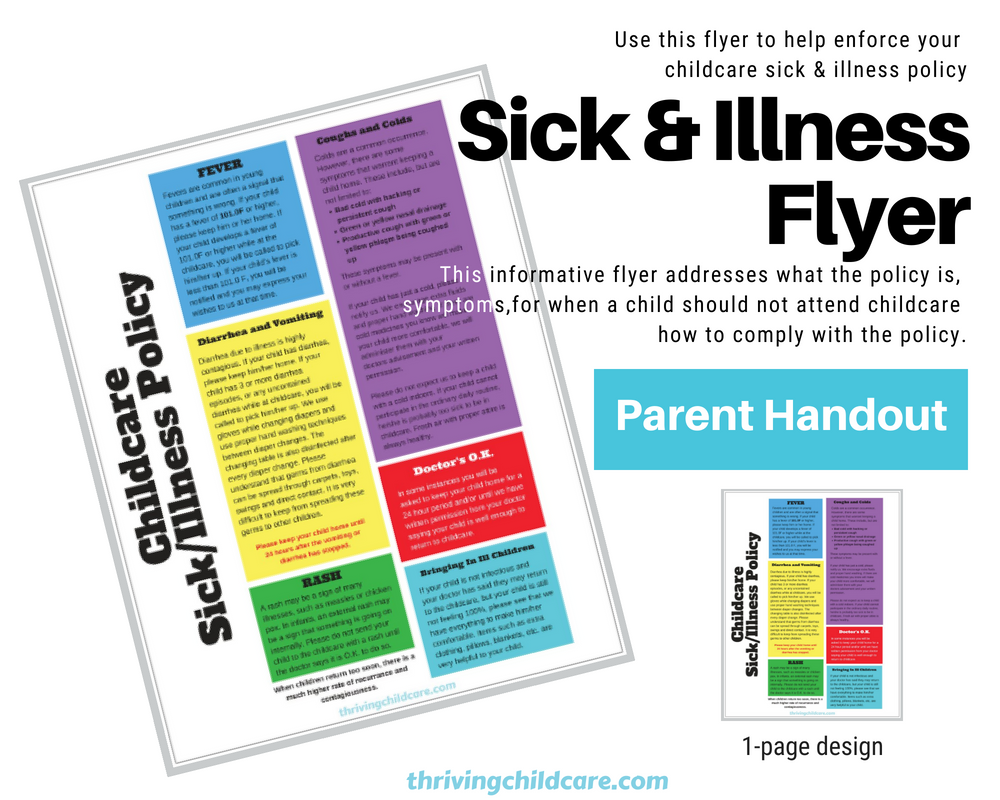
7. Communication
- Are there specific hours that parents are allowed to visit? The answer should be that “you are welcome and encouraged to visit anytime your child is in care.” Even though parents rarely take advantage of this, providers are encouraged to have what is called an “Open Door Policy”. In my program, I do stress that sometimes children get confused and feel that it is time to go when a parent visits, so they might have to take the child in that instance.
- How will information be communicated to parents about their child? Will you relate positive stories and experiences as well as concerns? What about meals eaten, nap was taken, toilet visits, etc. – Many programs use Daily Notes as a form of daily communication to parents.
- What is the preferred method of communication from parents to the caregiver? Do you prefer the person drop-in, appointment, phone or e‐mail? What times are good to reach you?
Newsletters are great to communicate many aspects of your program.
- Do you send out program newsletters? How often?
- How do you celebrate birthdays and holidays? Are parents expected and/or invited to participate?
- How would you handle a parent complaint? Have you ever had one reported to Community Care Licensing? – This is a touchy matter, but if you have it is best to get ahead of any concerns this might raise.
- Are parents encouraged to participate in the program? Do you ask for feedback regarding the program? – Do you have a way of capturing testimonials?
- What do you expect from a parent? Are conferences held to discuss a child’s progress on a regular basis?
- Are your policies and procedures in writing? Will the parent receive a copy of them? – This is commonly in the form of a Parent Handbook.
- Does the parent need to sign a contract? – please make this one a YES
- Do you have at least three references – past and present parents? This is where those testimonials come in handy.
Want to remember this? Save “Recipe for Quality Childcare” to your favorite Pinterest boards!
Are you a Quality Childcare?
So how did you fair? Do you need to get a few more “ingredients“? Look don’t be discouraged if there are areas where you need to improve or address.
I am almost certain that just about every program has been there at one time or another. The point of this is to be aware of just what criteria are for a Quality Childcare Program.
Let’s chat down below. What is one takeaway or action item you got out of this post? Leave me a comment below and tell me about it.
Related Reading:
- 10 Child Care Services You Can Offer
- 10 Ways to Build Credibility for Your Child Care Business
- Why you should never give a parent tour
- What to Include in a Child Care Handbook
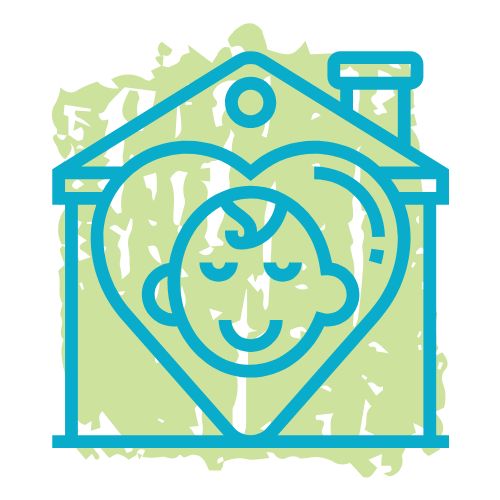
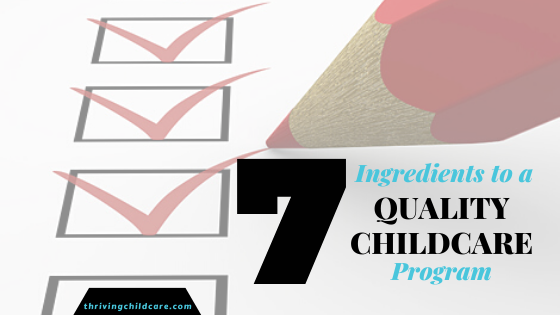

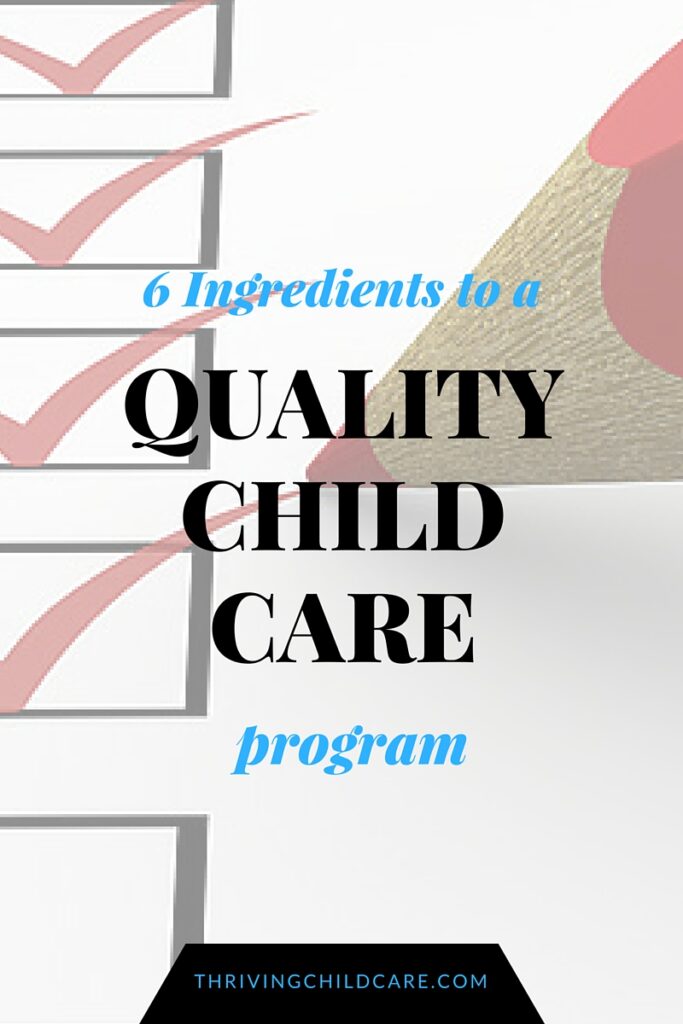





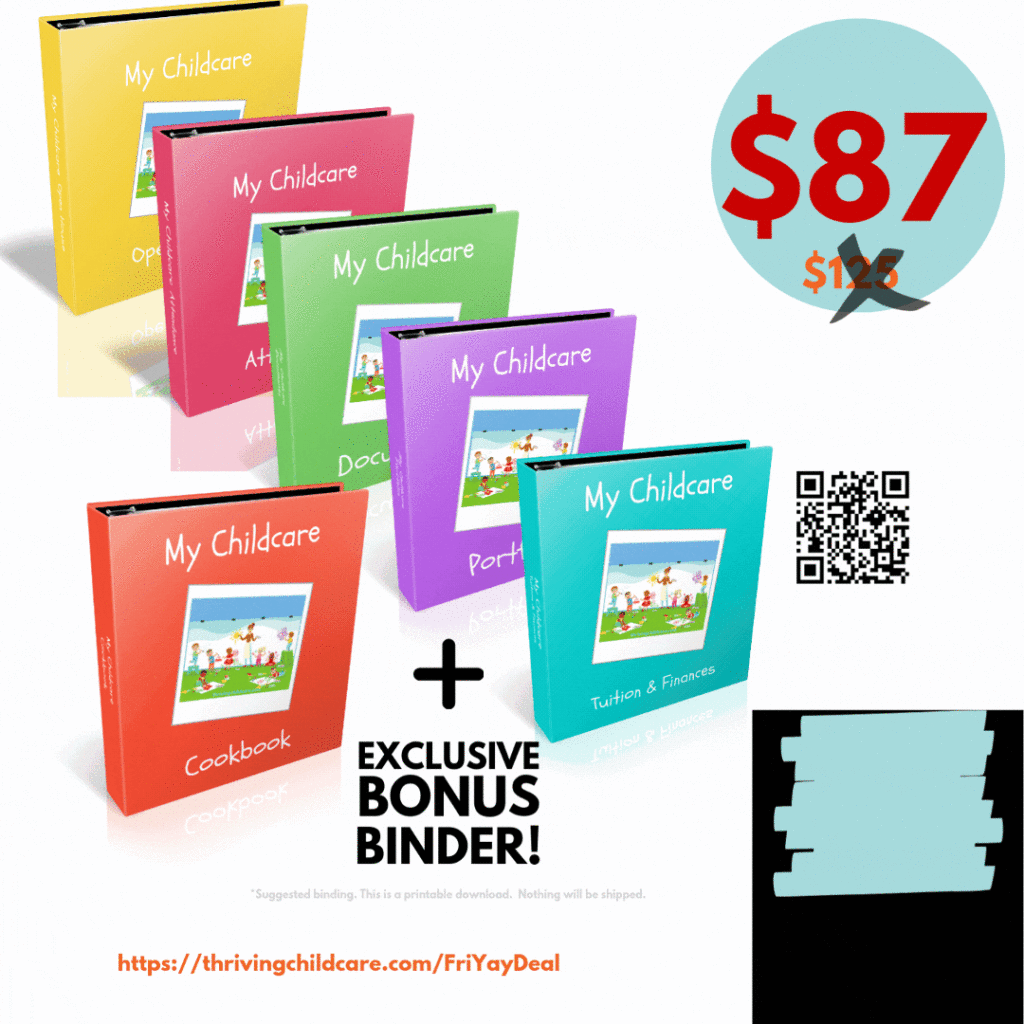

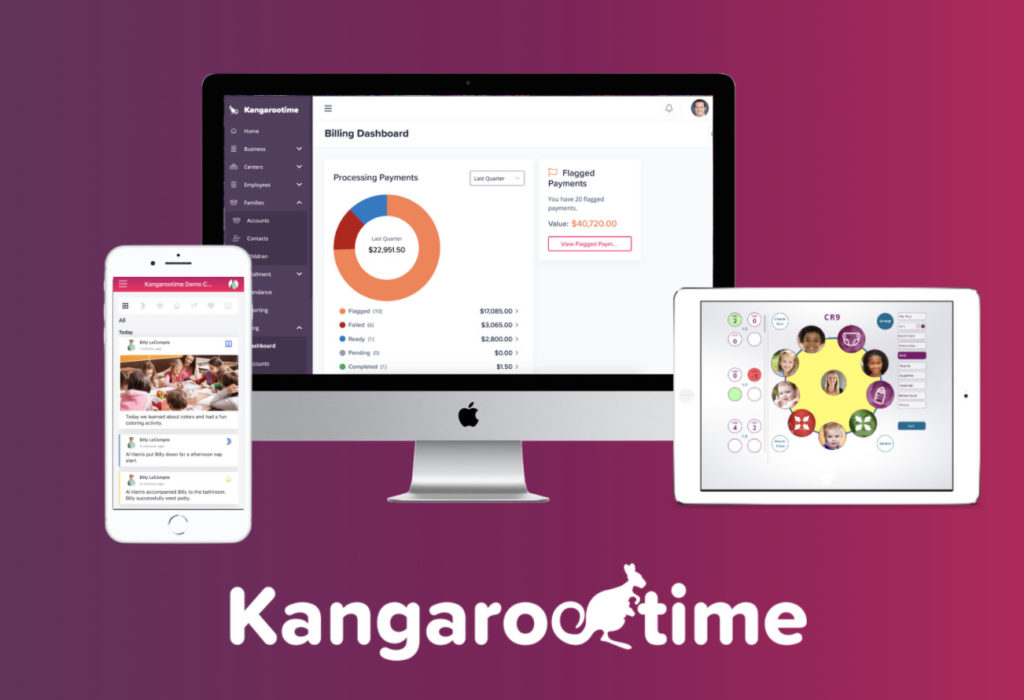

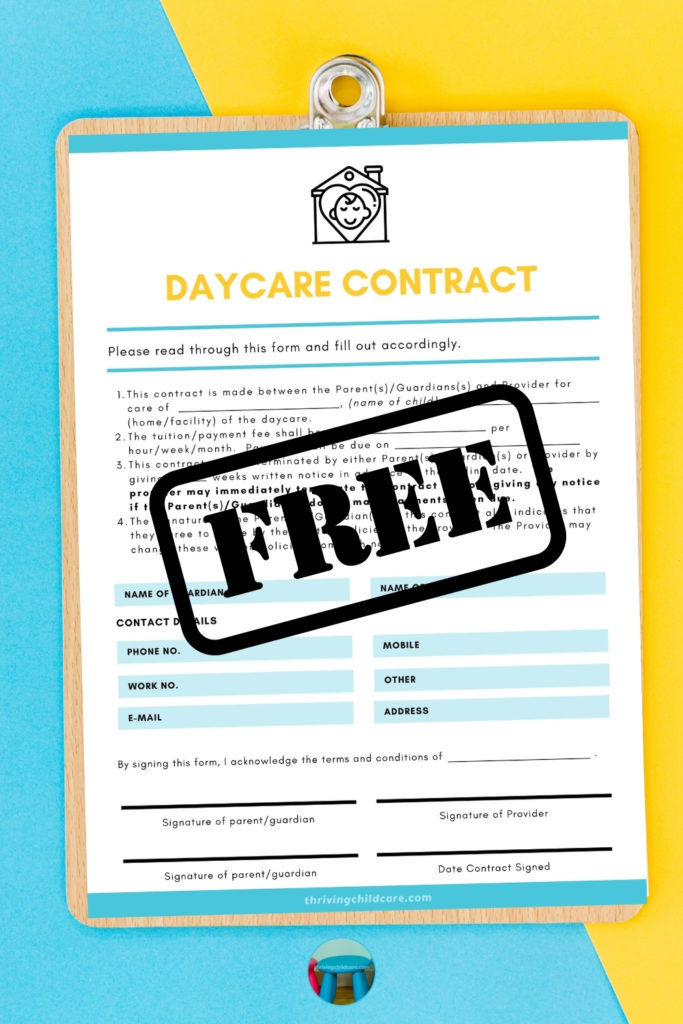
One Response
Wonderful article
Yes I saw the date , but it’s timeless
I think a flyer with some of the most important questions and answers would be great to add to our touring folders!!
It would look very professional!!